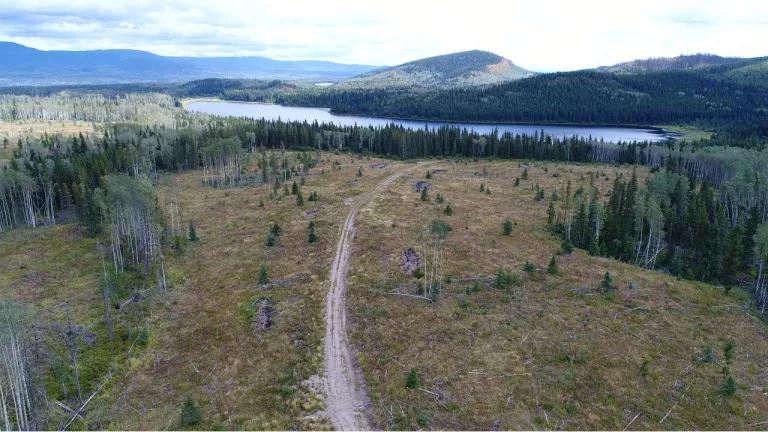
Forest in Northern Ontario
One year after 145 countries signed onto the Glasgow Leaders’ Declaration on Forests and Land Use, pledging an end to deforestation and land degradation, more than 100 scientists from around the world have written to the signatories to dispel one of the most insidious barriers to the Declaration’s success: the myth of the sustainability of industrial logging in primary forests.
In the year since the signing of the Glasgow Declaration at last year’s UN climate conference, the agreement’s promise of global accountability for both deforestation and forest degradation has failed to materialize. The same Global North signatories announcing new measures to address tropical deforestation have continued driving the loss of some of the world’s most climate-critical forests within their own borders, clinging to claims of industrial logging’s sustainability.
Writing to the Glasgow Declaration signatories, more than 100 international scientists, including leading voices such as Dr. Bill Moomaw, Dr. Brendan Mackey, and Dr. Dominick DellaSala, have unequivocally rejected the Global North’s continued abrogation of responsibility. Compliance with the Glasgow Declaration, they make clear, requires ending industrial logging in never-before-logged primary forests. The industrial logging of these forests, they write, “invariably depletes or mars the forest’s original characteristics, no matter the subsequent forest regeneration practices.”
The letter takes aim at a foundational element of the Global North’s claims of forests’ renewability, the erasure of the importance of primary forests.
"Treating a primary forest as equivalent to an industry-replanted forest based on the fact that they both have trees is like equating a Van Gogh with an amateur finger painting, citing the commonality of the paint: reductionist to the point of meaninglessness."
International forest policy treats all forests as equal, whether a centuries-old ecosystem or saplings placed among logging debris. This approach stems from the fact that the most common metric for forest impacts, the term “deforestation,” narrowly applies only when a forest is converted to an entirely different land use like a parking lot or agricultural use—when there’s no prospect of trees regrowing on the cleared land.
In the Global North, where deforestation is rare, but industrial logging rampant, treating a primary forest as equivalent to an industry-replanted forest based on the fact that they both have trees is like equating a Van Gogh with an amateur finger painting, citing the commonality of the paint: reductionist to the point of meaninglessness. This paradigm means that a country like Canada can clearcut more than a million acres of forest each year, much of this in irreplaceable primary forest, rank third globally in intact forest landscape loss, and still claim near-zero deforestation.
The scientists’ letter makes clear that compliance with the Glasgow Declaration–and climate action more broadly–requires finally recognizing the irreplaceability of primary forests and acknowledging the climate and biodiversity toll of eroding these ecosystems.
In addition to committing the 145 signatories to ending deforestation, as so many forest frameworks have in the past, the Glasgow Declaration included a requirement to halt and reverse land degradation by 2030. “Degradation” moves beyond the narrow definition of “deforestation” to mean, more broadly, the loss of a forest’s value. Logging in primary forests, the scientists write, is “a clear and egregious example of forest degradation” and ”provides a clear starting point for policies implementing countries’ commitments under the Glasgow Declaration.”
The letter is also a firm dismissal of increasing attempts from governments and industry to water down degradation’s definition or insist that, with robust replanting programs, logging in primary forests doesn’t constitute degradation.
The scientists didn’t just articulate scientific clarity, but a policy imperative. While the Glasgow Declaration set the stage for a more equitable, whole-of-planet approach to forest protection, it will depend on countries like Canada, the United States, and Sweden taking accountability for logging’s true impact and modeling more sustainable ways forward. The opportunities for leadership and the creation of climate-friendlier economies are vast—but only with the recognition of what’s actually at stake.



